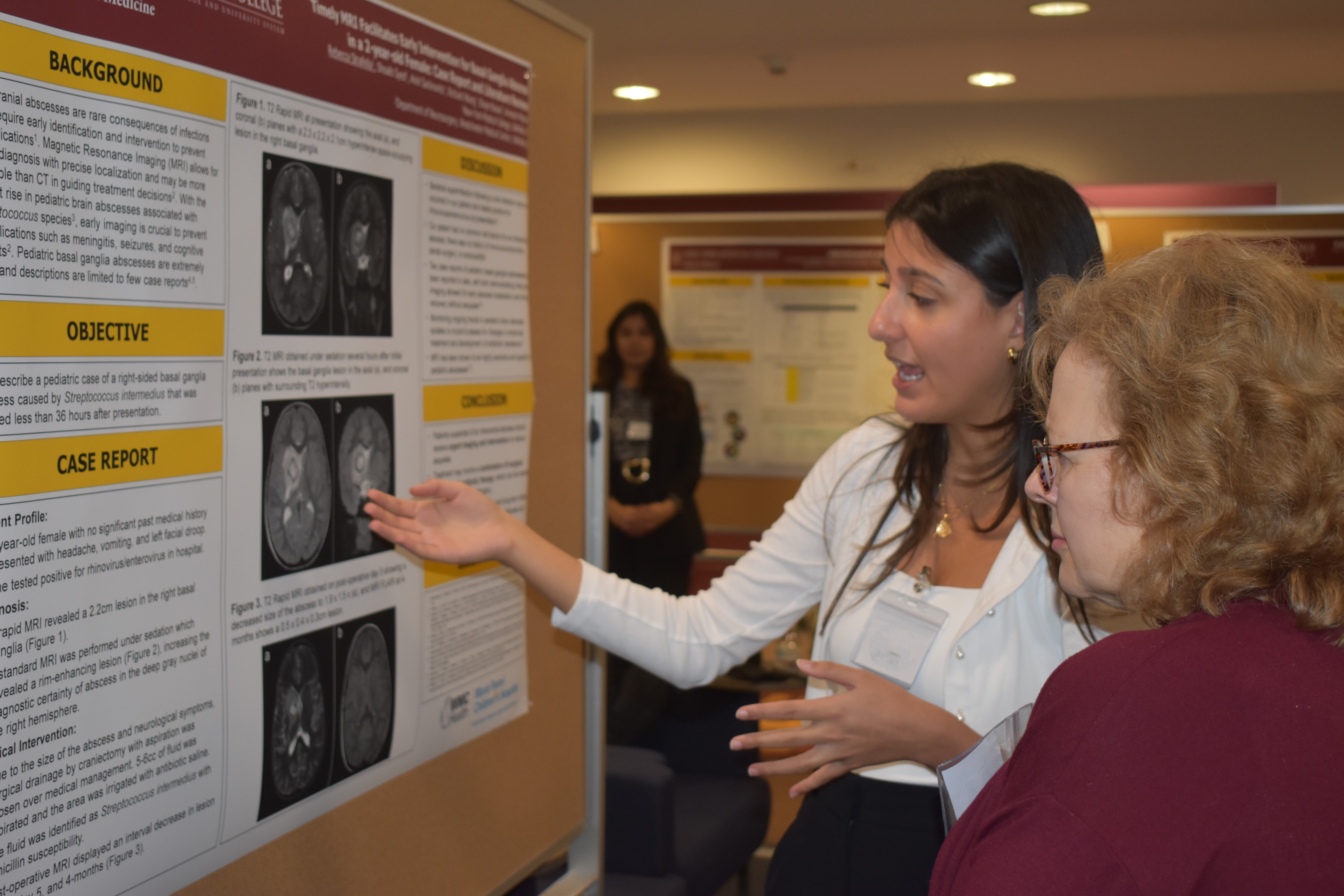Future Healers: 2023 Forum Highlights Medical Student Research
Many of the Nearly 100 Research Projects Have Been Published in High-Quality Journals and Presented at National Conferences

Nearly 100 medical students showcased their research at the 28th Annual Medical Student Research Forum on December 8. Through poster and oral presentations, the student research covered a wide range of topics in basic and clinical sciences, including screening and treatment of H. pylori to prevent gastric cancer in high-risk immigrant populations, the prevalence of hypertension in rheumatoid arthritis patients, brain-responsive neurostimulation in children, and autonomic dysfunction in autoimmune encephalitis.
"This year’s forum continued the yearly upward trend in participation. More importantly, the presentations were of uniformly high quality, both in terms of professional format and scientific rigor,” said Mary Petzke, Ph.D., assistant dean for medical student research. “Peer-reviewed scholarly products are scientific currency, and as I spoke with the presenters, I was impressed by the number of projects that had been published or accepted for publication in high-quality journals and had been presented by the student author at national conferences. I would like to especially thank the mentors, both within and beyond New York Medical College (NYMC) for their dedicated commitment and investment of time and resources. Students are always seeking research opportunities, and it is these dedicated faculty and clinicians who enable their success."
The day opened with remarks by Neil W. Schluger, M.D., dean of the School of Medicine and professor of medicine. “The joy and excitement of research is that you ask a question and answer it, and in doing so you create knowledge. The hope is that knowledge will at some point improve someone’s life somewhere in the world. As physicians, we seek to improve the lives of our patients, and research is really where that begins. Why is that person suffering from that disease? Why doesn’t this drug work? What causes that illness? We frame questions and design experiments, and if we’re lucky and patient and work hard, we get those answers. I think that is one of the most intellectually exciting and personally satisfying things we can do as physicians.”
This year’s keynote address was delivered by William Frishman, M.D., chair emeritus of the Department of Medicine and professor of medicine and of pharmacology at NYMC, and former director of medicine at Westchester Medical Center, who spoke on his distinguished 50-year career as a clinical investigator in cardiovascular pharmacology and as a research mentor. Dr. Frishman has authored and co-authored more than 1,300 original articles, reviews, and book chapters, including 700 with medical students in peer-reviewed journals. He has also been involved in more than 150 industry-sponsored clinical drug trials and served as a principal investigator on multiple NIH-funded studies, including the Systolic Hypertension in the Elderly Trial, the Women’s Health Initiative Trial and the Bronx Longitudinal Aging Study.
Dr. Frishman outlined the secrets to a long life during his remarks. “Dying of old age is not death from an acquired disease, but a tribute to advances in modern medicine, public health, and political activism, functions that have allowed more individuals to reach their natural life span,” he said, while also noting genetics, modifying high-risk behaviors, family and social support, and cultivating optimism as some of the contributing factors.
Dr. Frishman also offered some words of advice to the student researchers: “Seize the moment. If you see an opportunity, go for it. That is where most of us involved in research found our success. It’s so important to find a mentor and sometimes even a mentor will find you.”
The Research Forum was planned entirely by medical students – Sonali Dadoo, Class of 2024; Aditya Gandhi, Class of 2024; Fangyi Lin, Class of 2024; Kristy Tefft, Class of 2024; Kathleen Harwood, Class of 2025; Michelle Klausner, Class of 2025; Leah Sittenfeld, Class of 2025; Doria Weiss, Class of 2025; Sam Beber, Class of 2026; Shelcie Fabre, Class of 2026; Aarti Jain, Class of 2026; Matthew Weiss, Class of 2026; Robert Abrahams, Class of 2027; Lauren Fleshner, Class of 2027; Kyla Holbrook, Class of 2027; and Linda Msinjili, Class of 2027.
The day concluded with awards presented to students for excellence in research.
Dean's Award
Alexandra Jellinger, Class of 2026
“Chronic Activation of a Negative Engram Induces Behavioral and Cellular Changes”
Oral Presentation Awards
First Place
Carolina Taico, Class of 2026
“Potential Treatment of Food Anaphylaxis: The Effects of Plant-derived Compound Formononetin in Basophil Degranulation and Gene Expression of KU812 Basophils”
Second Place (tie)
Alessandra Moscatello, Class of 2025
“Pattern of Airway Injury Repair in an Orthoptic Tracheal Isograft Mouse Model”
Tom Zhang, Class of 2025
“Targeting HER2 with Antibody-drug Conjugates as Therapy for Tumors Driven by Neuregulin 1 (NRG1) Rearrangements”
Basic Science Poster Awards
First Place (tie)
Michelle Klausner, Class of 2025
“Role of IncRNAs FAM95C and AC004603in Papillary Thyroid Cancer Cell Differentiation and De-differentiation”
Andrew Penunuri and Jonathan Wong, Class of 2026
“Possible Chemosensitizing Effect of Monk Fruit Extracts on Human Bladder Cancer Cells”
Second Place (tie)
Courtney Abbriano, Class of 2027
“Cucurbit[7]uril-adamantane Host: Guest Pretargeting with 203Pb-labeled Radioligands in Xenograft Models”
Nikki Huhulea, Class of 2026
“DREADD Modulation of Medial Prefrontal Cortex Circuits of Narcolepsy”
Third Place
Rebecca Kann, Class of 2026
“The Role of Interleukin-1 Driven Inflammation in Recessive Dystrophic Epidermolysis Bullosa”
Clinical Science Poster Awards
First Place
Ashley Rosenberg, Class of 2026
“Brain-responsive Neurostimulation (RNS) in Children – A Case Series and Systematic Review”
Second Place (tie)
Eitan Rabinovich, Class of 2026
“Cervical Vertebroplasty with Anterior Discectomy and Fusion for Spinal Stenosis Secondary to Severe Osteoporosis: A Case Report”
Alexander Park, Class of 2026
“Perimesencephalic Hemorrhage: Case Report and Literature Review”
Kavya Tangella, Class of 2026
“Timely MRI Facilitates Early Intervention for Basal Ganglia Abscess in a 2-year-old Female: A Case Report and Literature Review”
Third Place
Alexandra Chaves, Class of 2026
“Seizure Freedom After Failure of Levetiracetam vs Sodium Channel Blocker”
